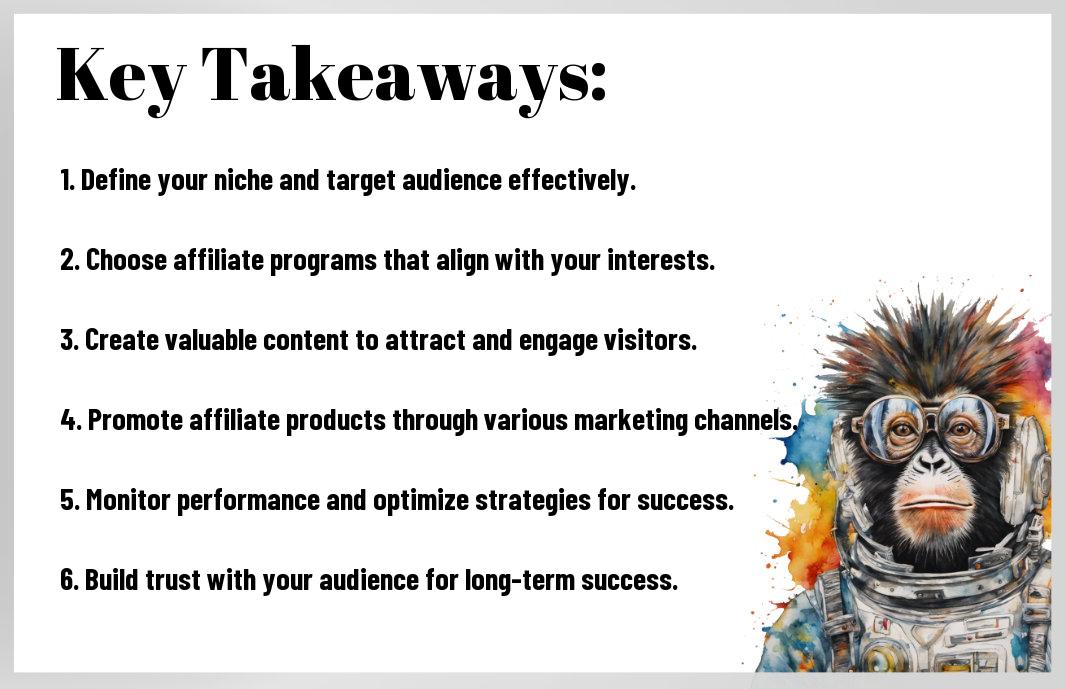With the rise of online business opportunities, affiliate marketing has emerged as a popular way to earn passive income. In this blog post, I will guide you through the fundamentals of affiliate marketing, showcasing how it works and what you need to get started. Whether you’re a beginner or simply exploring different avenues for income, understanding the basics will empower you to leverage this profitable venture effectively. Join me as I explore the necessary steps to set you on the path towards success with affiliate marketing!


Understanding Affiliate Marketing
For anyone looking to explore into the realms of online income, understanding affiliate marketing is an imperative first step. This marketing strategy involves promoting products or services offered by other companies and earning a commission for every sale made through your marketing efforts. As an affiliate marketer, I act as a bridge between the consumer and the merchant, leveraging my influences or platforms to drive traffic and sales, which ultimately translates into revenue for both parties.
What Is Affiliate Marketing?
Marketing in the context of affiliate marketing is a performance-based model where you, the affiliate, partner with a company to promote their offerings. When your unique affiliate link is used by customers to make a purchase, you receive a portion of the revenue generated from that sale. This setup allows you to earn money without having to create your own products or manage inventory. It’s a win-win situation—you can explore your passion for marketing while providing value to potential customers.
Key Terminology and Concepts
About affiliate marketing, you’ll encounter several key terms that are important to grasp. These include affiliate link, which is a unique URL assigned to you for tracking sales, and commission rate, the percentage of the sale you earn as a reward for your marketing efforts. Additionally, the merchant refers to the company whose products you’re promoting, while the affiliate network is the intermediary that connects affiliates with merchants, often providing tools for tracking and reporting.
For instance, understanding the concept of conversion rates—which measures the percentage of visitors who take action, such as making a purchase—can help you assess your marketing effectiveness. Additionally, knowing about cookie durations—the period during which a sale will count for you after a user clicks your affiliate link—can greatly impact your potential earnings. Familiarizing yourself with these terms and concepts will empower you to navigate the affiliate marketing landscape more effectively and strategically.

The Benefits of Affiliate Marketing
Any aspiring entrepreneur or seasoned marketer can benefit significantly from affiliate marketing. One of the most appealing aspects of this business model is the opportunity to generate a stream of income without needing to develop, produce, or stock your own products. Instead, you promote someone else’s products or services, and earn a commission for each sale made through your unique referral link. This paves the way for individuals to engage in an entrepreneurial endeavor with minimal startup costs, making it accessible for many people looking to diversify their income sources.
Passive Income Potential
At the heart of affiliate marketing lies the promise of passive income. By creating content once—such as a blog post, video, or social media campaign—you can continue to earn money over time as people make purchases through your links. This means that, after your initial effort, you could potentially earn commissions without any further work. I find this aspect particularly rewarding, as it allows me to focus on other projects while still generating revenue from my previous efforts.
Flexibility and Scalability
At the same time, affiliate marketing offers incredible flexibility and scalability. You can choose when and where you work, whether it’s from the comfort of your home or while traveling. As you start to gain traction and develop skills, you’re free to explore various niches or markets without any restrictions. This flexibility allows you to adapt to changes in the market or your personal interests, providing a truly unique working experience tailored to your lifestyle.
Understanding the scalability of affiliate marketing is equally important for maximizing its benefits. As you grow your online presence and expand your audience, you can significantly increase your earning potential. There are no limits to how many products you can promote or how many affiliate programs you can join. If one strategy works, you can double down on it or implement similar tactics across multiple platforms to enhance your income stream. This adaptability to scale can lead to greater financial independence over time.
Choosing the Right Affiliate Program
After stepping into the basics of affiliate marketing, I found that one of the most significant steps in my journey was choosing the right affiliate program. With so many options available, it’s important to understand what fits your niche and audience. I recommend checking out Affiliate Marketing for Beginners: Step-By-Step Guide (2024) for comprehensive insights. Depending on your objectives, you may come across different types of affiliate programs. Here’s a quick overview:
| Type | Description |
|---|---|
| Pay-per-sale | Earn a commission when a customer purchases through your link. |
| Pay-per-click | Receive payment based on the number of clicks your links generate. |
| Pay-per-lead | Compensation for generating leads, like sign-ups or form submissions. |
| Recurring commissions | Earn ongoing payments for each customer you refer. |
| Multi-tiered programs | Earn commissions not just from your referrals but also from people they refer. |
Types of Affiliate Programs
Around this point in my research, I realized that not all affiliate programs are created equal. Each type serves different purposes and is designed to achieve different outcomes. For instance, if you have a product review blog, a pay-per-sale program might align best with your content strategy. Conversely, if you run a blog focused on lead generation, a pay-per-lead model could be more lucrative. Here are some imperative factors to consider:
- Reputation of the affiliate program
- Commission structure
- Cookie duration
- Support offered
- Performance tracking
Any selection process can be overwhelming at first, but clarity comes with exploration and research.
Factors to Consider When Selecting a Program
Before stepping into any program, I suggest evaluating several key factors that might influence your success. The reputation of the affiliate program is important because working with well-known brands can enhance your credibility. You also need to assess the commission structure, as some programs might offer higher payouts than others. Take into account factors like cookie duration, which determines how long after a user clicks your link you can still get credit for their purchase. Additionally, check the support provided by the program; this aspect can greatly affect your overall experience.
- Product relevance to your niche
- Payment methods
- Tools and training available
- Market demand for products
- Competition level
Knowing all these factors will help you choose a program aligned with your goals and audience.
Types of programs can also vary greatly; some focus strictly on high-ticket items, while others promote subscriptions or digital products. Understanding these approaches will give you valuable insights into which programs might be the best fit for your platform. Any affiliate marketer must also take into consideration the potential risks and benefits involved, such as market saturation or a negative brand reputation.
Setting Up Your Affiliate Marketing Platform
Not every platform is created equal when it comes to affiliate marketing. To ensure success, I believe it’s important to focus on the right setup that shares your unique voice and covers a niche you are passionate about. This starts with the most traditional approach: building a website or blog, where I can create content that resonates with my audience and promotes relevant products effectively. Having a professional-looking website not only establishes credibility but also offers an area where you can control the content and layout to fit your goals.
Building a Website or Blog
An effective website or blog serves as your home base for affiliate marketing activities. It’s where I can publish reviews, guides, and tutorials that link to the products or services I am promoting. Furthermore, it’s important to incorporate SEO strategies into my blog posts, which will help in driving organic traffic to my site. With self-hosted platforms like WordPress, you have the advantage of flexibility and customization, allowing me to create a user-friendly experience that keeps my audience engaged.
Utilizing Social Media and Other Channels
Channels such as social media, email newsletters, and forums are valuable extensions of my affiliate marketing platform. By leveraging these platforms, I can reach a wider audience and drive traffic to my website. It’s vital to share engaging, informative content and foster community discussions that maintain interest in my niche. Additionally, I can utilize advertising tools available on social media platforms to target specific demographics that are more likely to resonate with my affiliate products.
Indeed, using social media and other channels isn’t just about promotion—it’s also about building relationships. I find that engaging directly with my audience through comments, messages, and posts can significantly increase trust. Additionally, utilizing platforms like Instagram, Facebook, or even TikTok can help showcase products in action, creating a compelling narrative around them. However, it’s important to balance promotion with valuable content to avoid coming off as overly sales-oriented, which can turn potential customers away. Maintaining a consistent and authentic presence can lead to stronger engagement and ultimately drive more conversions.
Creating Effective Marketing Strategies
Many aspiring affiliate marketers underestimate the importance of developing effective marketing strategies. By understanding your audience and crafting tailored campaigns, you can greatly enhance your chances of success. One helpful resource to get you started is How to start affiliate marketing in 2024: 6 steps to a successful affiliate business, which covers the fundamental principles of affiliate marketing and guides you through the initial phases of establishing your strategy. Begin by identifying your niche, setting clear goals, and determining the best platforms to engage with your target audience. These steps will serve as the foundation for all of your marketing efforts moving forward.
Content Creation and Promotion
On the path to becoming an effective marketer, the quality of your content plays a significant role in your overall success. I have found that producing valuable, informative, and engaging content not only attracts potential customers, but also encourages them to trust your recommendations. This involves writing blog posts, creating videos, or even hosting webinars that resonate with your audience. Promotion strategies are equally important, as they allow you to share your content across various channels. Utilize social media, email marketing, and SEO to amplify your reach and engage with potential customers more effectively.
Leveraging SEO and Analytics
To ensure that your affiliate marketing strategies are working for you, I rely heavily on the power of SEO and analytics. Implementing SEO best practices helps your content rank higher in search engine results, making it more discoverable. I focus on optimizing keywords, creating quality backlinks, and ensuring a good user experience on my site. Additionally, analyzing performance metrics can provide great insights into what is resonating with my audience. It allows you to refine your strategies continually and make data-driven decisions that improve your overall marketing efforts.
Creating an effective marketing strategy is not a one-time event but an ongoing process. By consistently monitoring and adjusting your approach based on analytics, you can stay ahead of trends and ensure your content remains relevant. This adaptability is what will set you apart from the competition in the ever-evolving world of affiliate marketing.
Compliance and Best Practices
Now that you have an understanding of the affiliate marketing landscape, it’s imperative to examine into compliance and best practices. Operating within the legal framework not only protects your business but also builds your credibility with your audience. By adhering to the rules and regulations, you establish trust, which is vital for long-term success in this field. Compliance might feel like an intricate web of laws and guidelines, but once you grasp the basics, you’ll find it easier to navigate. Always be aware of the guidelines from major platforms, such as the FTC, which require you to disclose your affiliate relationships.
Understanding Legal Requirements
Across different jurisdictions, the legal requirements surrounding affiliate marketing can vary, and it’s vital that I educate myself on these laws to ensure compliance. The Federal Trade Commission (FTC) in the United States mandates that you clearly disclose any material connections with brands or products that you promote. Whether you’re blogging, creating videos, or using social media, a simple disclaimer stating that you may earn a commission from purchases made through your links is generally sufficient. This transparency not only fulfills legal obligations but also enhances your credibility.
Maintaining Ethical Standards
Ethical standards in affiliate marketing stem from a commitment to honesty and integrity in your promotional efforts. I find that recommending products or services that I genuinely believe will benefit my audience is not only ethical but also enhances my reputation. It is important to prioritize quality and value over financial gain. Engaging in misleading practices, such as promoting low-quality products solely for commission, can lead to damaging your relationship with your audience and adversely affecting your credibility.
Due to the rapid expansion of affiliate marketing, it’s vital to sustain a commitment to ethical standards. Engaging in practices like disclosing your affiliations and being transparent about your commissions fosters a positive relationship with your audience. By avoiding misleading claims and focusing on genuine product recommendations, you can cultivate a loyal following. This approach ultimately leads to better outcomes for you and your audience, as trust tends to yield more sustainable success in affiliate marketing.
Final Words
Ultimately, I believe that understanding the basics of affiliate marketing is key to establishing a successful online venture. It’s a powerful way to monetize your website or social media presence by promoting products or services that resonate with your audience. To get started, focus on selecting a niche you are passionate about, signing up for reputable affiliate programs, and creating quality content that engages your visitors. Your commitment to building trust and providing value will ultimately determine your success in this field.
As you launch on your affiliate marketing journey, take the time to analyze the performance of your affiliate links and optimize your strategies based on what works best for you. By staying informed about industry trends and continuously improving your skills, you’ll be better equipped to navigate the landscape of affiliate marketing. I encourage you to embrace this opportunity—your dedication and efforts can lead to rewarding outcomes.
Check out this FREE course on The #1 Beginner Friendly Fully Automated Business From Home.
FAQ
Q: What is affiliate marketing and how does it work?
A: Affiliate marketing is a performance-based marketing strategy where businesses reward affiliates for driving traffic or sales to their products or services through the affiliate’s marketing efforts. The process typically involves three parties: the merchant (who provides the product), the affiliate (the marketer), and the consumer. Affiliates promote the merchant’s offerings using unique tracking links. When a consumer makes a purchase or takes a desired action through this link, the affiliate earns a commission.
Q: What are the key steps to getting started with affiliate marketing?
A: To begin affiliate marketing, follow these vital steps: 1) Choose a niche: Focus on an area you are passionate about or have knowledge in to connect better with your audience. 2) Research affiliate programs: Look for reputable programs that offer products or services in your chosen niche. 3) Build a platform: Create a website, blog, or social media presence to share content and promote products. 4) Produce quality content: Develop valuable and engaging content to attract and retain your audience. 5) Market your content: Utilize social media marketing, SEO, and email marketing to drive traffic to your platform and affiliate links.
Q: How can I effectively promote affiliate products?
A: To effectively promote affiliate products, consider these strategies: 1) Write product reviews: Share honest and unbiased information about products or services to help readers make informed decisions. 2) Create how-to guides or tutorials that incorporate affiliate products naturally. 3) Use compelling calls-to-action (CTAs) within your content to encourage readers to click on your affiliate links. 4) Leverage email marketing to reach your subscribers with tailored offers and promotions. 5) Engage with your audience on social media by sharing testimonials, success stories, or behind-the-scenes looks at the products.



